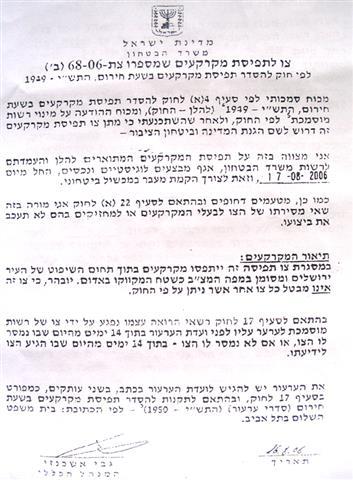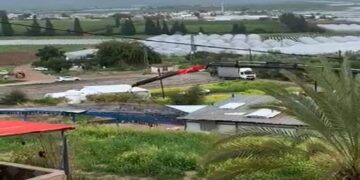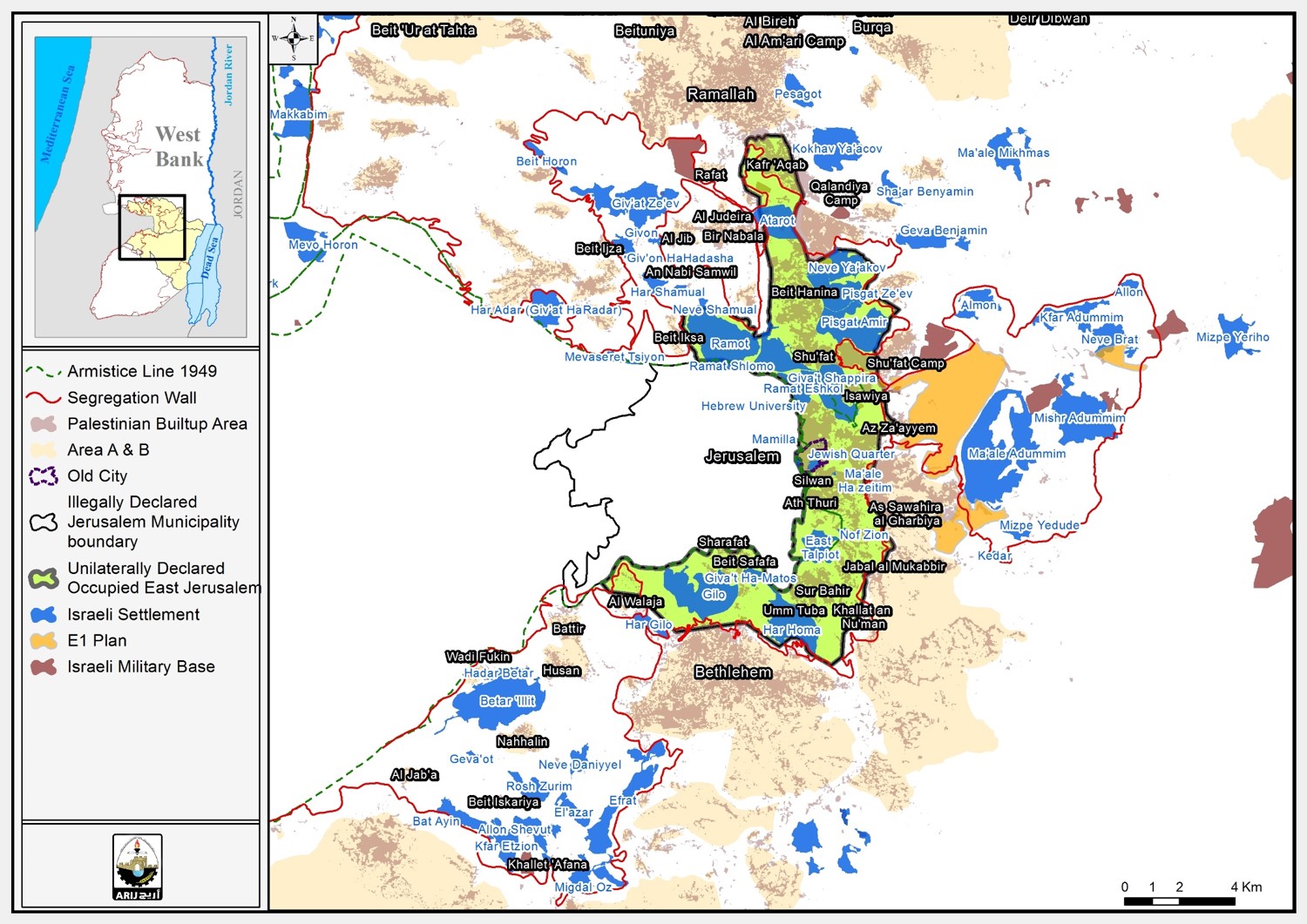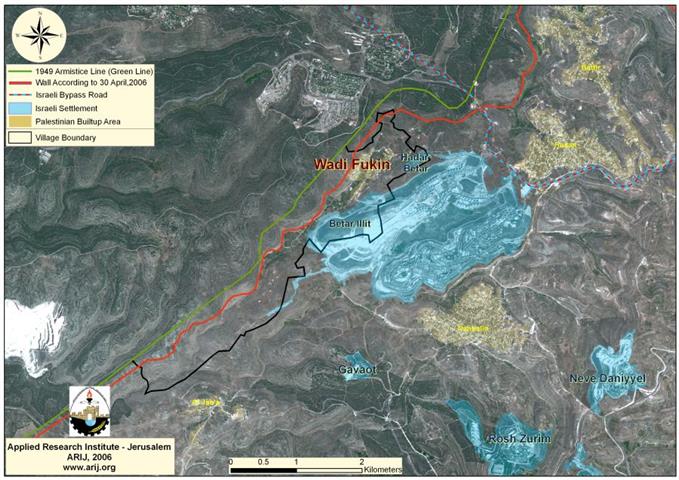The Israeli occupation, with all its mechanism and military and civil apparatuses, is continuing its policy of confiscating the property of Jerusalemites, especially their lands, using a number of tactics and pretexts. One of the tools of confiscation include the Segregation Wall which deprived Palestinian Jerusalemites of more than 40,000 dunums so far. For example, on February 9th, 2005, Israeli occupation forces submitted military orders calling for the confiscation of 50 dunums for the purpose of enlarging the checkpoint located at the southwestern entrance of the Shu�fat camp. On February 11th, 2005, only two days after the first confiscation order, another order was issued calling for the confiscation of 25 dunums of the lands of Dhaher Al Barouk and Ras Abu Sbeitan in Al Izzariya (Bethany) on the Mount of Olives for the purpose of the establishment of Al Izzariya Terminal.
On the 17th of August, 2006, the Israeli Ministry of Defense issued two military orders under the number of B/68/06 stating the confiscation of about 11 dunums for the establishment of a crossing terminal to the south west of Shu'fat refugee camp in Jerusalem. The first order was signed by the legal advisor of the Israeli ministry of 'defense', and the second bythe director general of the Israeli ministry of 'defense' The first one reads as follows: 'After I was convinced that issuing this order to put the specified land under the authority of the Ministry of Defense is essential for the protection of national security and the security of the population, I herby order the confiscation of the specified land starting on August 17th, 2006, for the goal of establishing a security terminal within the boundaries of the city of Jerusalem. Due to the urgent nature of this order, the inability of submitting the order to the land owners does not delay its execution'.



Photos 1, 2 & 3: copies of the military order and the attached map
signed by the legal advisor of the Israeli ministry of defense )
The order gave a period of 14 days to object to the content of the order. It also specified a date on which a tour of the confiscated lands is set to be held with the landowners.
Case documentation
The confiscated land belongs to a large number of Palestinian Jerusalemites from the families of Al Dajani, Ishtiwi, Tamimi and Al Rashiq. LRC�s field worker have made visits to a number of owners of the land and documented the following cases:
CASE STUDY 1
Mr. Fawzy Issa Ishtiwi Alqam, 74 years old, from Shu�fat indicated the following: ' I live with my extended family in my house that was built before the year 1967. The family consists of my four children and their families. The number of individuals in this family is 18. The house was built on a 10-dunum piece of land spreading between the entrance of Anata in the north and the French Hill in the south. The series of land confiscations started in the beginning of the eighties when the Jerusalem Municipality confiscated 5 dunums to use it as a garbage dump and incinerator. Part of the land was later used as part of the settlement of the French Hill while other parts were confiscated to be used as part of the Shu�fat-Jericho Road. In the year 1985, the Municipality forced us to demolish a cement block factory and storage shops under the pretext that the land upon which they were established are state lands and that it was planned to be used for the �public benefit�. In the year 1987 the Municipality instituted the DAFO Project to transform garbage into fertilizer. The project lasted for about 11 years after which it was shut down due to conflict among the partners. Last winter we were surprised with a demolition order under the pretext that the house was built without the proper permits. We have hired the lawyer Sami Irsheid to follow up with the case. Yet, the court issued a decision in our absence to pay a fine of NIS 10,000. We are now left with only the lands upon which the house is built. We feel trapped in our own house. It is slated for demolition despite the fact that we have submitted a request for a building license since 1980 and we still have not heard anything from the Municipality. They even fined us NIS 35,000 paid by monthly installments of NIS 500 each for adding a 65-m2bathroom to the house'.
It is worth noting that Municipality bulldozers are currently plowing the lands west of the house to be used as a bus station.

photo 4: Bulldozers can be seen leveling the land for the establishment of the bus station)
At the end of August 2000 the IDF closed off the eastern and western entrances for the house of Mr. Fawzi Alqam and now the house has only one entrance leading to the overcrowded main road. Israeli soldiers stationed at the house do not allow anyone to enter or leave the house without an in-depth ID check. Mr. Alqam added that: ' We live in our house and on our land with tight nerves. Our heart drops every time we hear the sound of bulldozers around us'.
CASE STUDY 2
The occupation�s Ministry of Defense placed its hand on the lands of Mohammad Suleiman Al Dajani and his brother Abu Al Waleed Al Dajani. The area of the confiscated lands is 8 dunums (out of 11-dunum land) upon which 5 storage shops for the Dajani family are built. The land is to be used for the Israeli terminal and is located on the road leading to Shu�fat camp. The confiscation order was issued on the 17th of August, 2006 accompanied by an unclear map that identified the confiscated land. The order gave an objection period, which was totally useless as the order indicated that � the inability of giving the order to landowners does not postpone its execution� which means that the objection, or lack thereof, of the landowner won�t change the fact that it will be carried out anyhow.


Photos 5&6: a copy of the military order against the Dajani family
which was signed by the director general of the Israeli ministry of defense)
(photo 7: The Dajani's 5 storage shops to be eparated behind the planned terminal in Shu'fat )
CASE STUDY 3
In the year 1985 the Municipality of occupied Jerusalem placed its hands on a piece of land that belongs to the Jerusalem Electricity Undertaking for the purpose of establishing a by-pass road connecting between Jerusalem and the Israeli settlement of Pisgat Ze�ev. It was also planned to confiscate more lands from the Palestinian villages of Shu�fat, Beit Hanina and Hizma for the establishment of the Road. At that point on time, the Municipality has refused to provide the company with an alternative piece of land as a substitute of the confiscated one. Instead, the Municipality allowed the company to use a 5-dunum piece of land the Municipality had confiscated from the Fawzy and Mohammad Ishtiwi brothers for �the public benefit.� The company started to use the land for storage purposes for a low yearly rent of NIS 1,250.

Photo 8: parts of the house of Ishtiwi family can be seen in the right side of the picture)
In the year 1999 the Municipality increased the rent substantially to become NIS 9,418 and replaced the currency of payment to become US dollars rather than Israeli Shekels. The yearly payment was increased again in 2002 to become a whapping $12,000. In 2003 it became $15,000 in a clear policy of stealing the lands of others (land confiscation from the Ishtiwi brothers) and using that land for investment with ridiculously high rent which negates the purpose for which the land was confiscated for (public benefit). This is an obvious example of the fact that the law that is dominant in the occupation state is the law of the wild and the law of the powerful.
More land confiscation orders
Moreover, the Israeli Ministry of Interior issued on March 21st, 2006 an order to confiscate 20 dunums of the lands of Shu�fat in the Ras Shihada and Ras Khamis locations. Also, an order was issued on June 5th, 2006 to demolish 12 houses in the vicinity of Shu�fat refugee camp to make way for the Segregation Wall. In addition to that, and to make sure that the Wall devours the maximum dunums of Palestinian lands in Jerusalem, the planners of the Wall planned its route near Palestinian houses and establishments rather than plan it near lands confiscated since the 1980s.
The Land Research Center re-emphasizes that Palestinians have the right to their land, property, an appropriate housing, development, etc. These rights are recognized worldwide. All actions taken by the Israeli occupation authorities vis-à -vis Palestinian Jerusalemites and their property is a clear violation of the Universal Declaration of Human Rights which indicated that �No authority has the power to take away the right of property.� Such actions are also considered to be a violation of a number of human rights articles and conventions which obligates the signatories on these conventions to pressure Israel to put an end to its occupation of Palestinian lands and especially Jerusalem.
Prepared by
The Land Research Center
LRC













